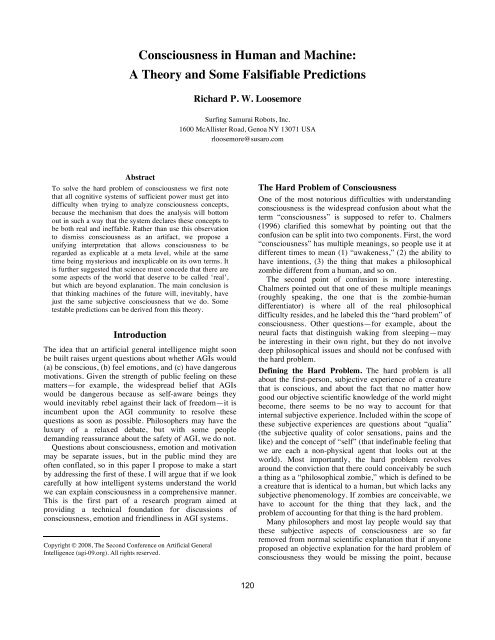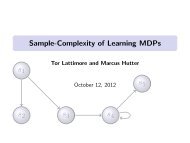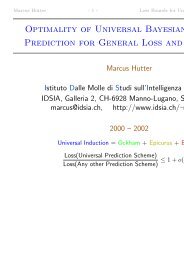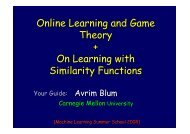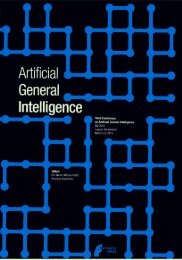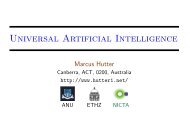A Framework for Evaluating Early-Stage Human - of Marcus Hutter
A Framework for Evaluating Early-Stage Human - of Marcus Hutter
A Framework for Evaluating Early-Stage Human - of Marcus Hutter
You also want an ePaper? Increase the reach of your titles
YUMPU automatically turns print PDFs into web optimized ePapers that Google loves.
Consciousness in <strong>Human</strong> and Machine:<br />
A Theory and Some Falsifiable Predictions<br />
Abstract<br />
To solve the hard problem <strong>of</strong> consciousness we first note<br />
that all cognitive systems <strong>of</strong> sufficient power must get into<br />
difficulty when trying to analyze consciousness concepts,<br />
because the mechanism that does the analysis will bottom<br />
out in such a way that the system declares these concepts to<br />
be both real and ineffable. Rather than use this observation<br />
to dismiss consciousness as an artifact, we propose a<br />
unifying interpretation that allows consciousness to be<br />
regarded as explicable at a meta level, while at the same<br />
time being mysterious and inexplicable on its own terms. It<br />
is further suggested that science must concede that there are<br />
some aspects <strong>of</strong> the world that deserve to be called ‘real’,<br />
but which are beyond explanation. The main conclusion is<br />
that thinking machines <strong>of</strong> the future will, inevitably, have<br />
just the same subjective consciousness that we do. Some<br />
testable predictions can be derived from this theory.<br />
Introduction<br />
The idea that an artificial general intelligence might soon<br />
be built raises urgent questions about whether AGIs would<br />
(a) be conscious, (b) feel emotions, and (c) have dangerous<br />
motivations. Given the strength <strong>of</strong> public feeling on these<br />
matters—<strong>for</strong> example, the widespread belief that AGIs<br />
would be dangerous because as self-aware beings they<br />
would inevitably rebel against their lack <strong>of</strong> freedom—it is<br />
incumbent upon the AGI community to resolve these<br />
questions as soon as possible. Philosophers may have the<br />
luxury <strong>of</strong> a relaxed debate, but with some people<br />
demanding reassurance about the safety <strong>of</strong> AGI, we do not.<br />
Questions about consciousness, emotion and motivation<br />
may be separate issues, but in the public mind they are<br />
<strong>of</strong>ten conflated, so in this paper I propose to make a start<br />
by addressing the first <strong>of</strong> these. I will argue that if we look<br />
carefully at how intelligent systems understand the world<br />
we can explain consciousness in a comprehensive manner.<br />
This is the first part <strong>of</strong> a research program aimed at<br />
providing a technical foundation <strong>for</strong> discussions <strong>of</strong><br />
consciousness, emotion and friendliness in AGI systems.<br />
Copyright © 2008, The Second Conference on Artificial General<br />
Intelligence (agi-09.org). All rights reserved.<br />
Richard P. W. Loosemore<br />
Surfing Samurai Robots, Inc.<br />
1600 McAllister Road, Genoa NY 13071 USA<br />
rloosemore@susaro.com<br />
120<br />
The Hard Problem <strong>of</strong> Consciousness<br />
One <strong>of</strong> the most notorious difficulties with understanding<br />
consciousness is the widespread confusion about what the<br />
term “consciousness” is supposed to refer to. Chalmers<br />
(1996) clarified this somewhat by pointing out that the<br />
confusion can be split into two components. First, the word<br />
“consciousness” has multiple meanings, so people use it at<br />
different times to mean (1) “awakeness,” (2) the ability to<br />
have intentions, (3) the thing that makes a philosophical<br />
zombie different from a human, and so on.<br />
The second point <strong>of</strong> confusion is more interesting.<br />
Chalmers pointed out that one <strong>of</strong> these multiple meanings<br />
(roughly speaking, the one that is the zombie-human<br />
differentiator) is where all <strong>of</strong> the real philosophical<br />
difficulty resides, and he labeled this the “hard problem” <strong>of</strong><br />
consciousness. Other questions—<strong>for</strong> example, about the<br />
neural facts that distinguish waking from sleeping—may<br />
be interesting in their own right, but they do not involve<br />
deep philosophical issues and should not be confused with<br />
the hard problem.<br />
Defining the Hard Problem. The hard problem is all<br />
about the first-person, subjective experience <strong>of</strong> a creature<br />
that is conscious, and about the fact that no matter how<br />
good our objective scientific knowledge <strong>of</strong> the world might<br />
become, there seems to be no way to account <strong>for</strong> that<br />
internal subjective experience. Included within the scope <strong>of</strong><br />
these subjective experiences are questions about “qualia”<br />
(the subjective quality <strong>of</strong> color sensations, pains and the<br />
like) and the concept <strong>of</strong> “self” (that indefinable feeling that<br />
we are each a non-physical agent that looks out at the<br />
world). Most importantly, the hard problem revolves<br />
around the conviction that there could conceivably be such<br />
a thing as a “philosophical zombie,” which is defined to be<br />
a creature that is identical to a human, but which lacks any<br />
subjective phenomenology. If zombies are conceivable, we<br />
have to account <strong>for</strong> the thing that they lack, and the<br />
problem <strong>of</strong> accounting <strong>for</strong> that thing is the hard problem.<br />
Many philosophers and most lay people would say that<br />
these subjective aspects <strong>of</strong> consciousness are so far<br />
removed from normal scientific explanation that if anyone<br />
proposed an objective explanation <strong>for</strong> the hard problem <strong>of</strong><br />
consciousness they would be missing the point, because


